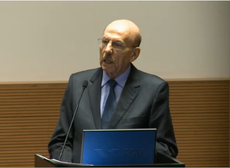
In the face of so many facts involving the public and private sectors in Brazil, the country still needs to develop actions that place employees from both spheres alongside anti-corruption initiatives. This is the opinion of ETCO's Executive President, Evandro Guimarães, who participated, in November, in the Clean Company Law Conference, organized by the Federal Comptroller General (CGU).
The event, held at the Getúlio Vargas Foundation in São Paulo, divided the discussion on the Anticorruption Law into panels. Among other points, the impact of the measure on companies, the necessary adaptations to integrity programs, the execution of leniency agreements were addressed.
CGU Chief Minister Jorge Hage highlighted that Law 12.846, which he called the Clean Company Law, represents another step in Brazil's search for mechanisms to fight corruption. He added, however, that measures such as the end of private financing of political campaigns and political reform are essential for the country to gain a new direction on the subject.
The Anticorruption Law is the first Brazilian legal framework to provide for important punishments (up to 20% of revenues or within the limit of R $ 60 million when it is not possible to measure it) for companies that violate ethics in national or foreign public administration. Companies can also be penalized with the wide publication of the condemnatory action.
Despite the severe punishment, Brazilian corporations approve the mechanism. During the CGU event, professor at Fundação Dom Cabral (FDC) Dalton Sardenberg presented a research that shows that 50% of the companies consulted are in favor of the new legislation. Another 31% are against and 19% neutral. The understanding of the law grows with the size of the business - 70% of large corporations understand the law. In medium and small companies, the percentage drops to 39% and 37%, respectively. While 63,6% of multinationals understand the Anti-Corruption Law, the rate is 40% for family companies.
But, regardless of size, participants at the CGU event stressed the importance of all corporations developing and following a code of conduct and an anti-corruption culture. “We would like all businesses to think of anti-corruption mechanisms as they think of CIPA (Internal Commission for Accident Prevention). May compliance be the concern and pride of all employees ”, emphasized Guimarães.




